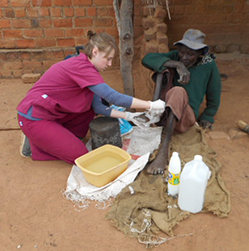KOKOMO, Ind. — For most nurses, medications for their patients are quickly available through a pharmacy or medication cart.
Whitley Lehr
But when your patients live in the African bush, the work may involve hours of picking leaves and digging roots, drying them out, and pounding them into powder with a wooden mortar and pestle, gaining a backache in the process.
Indiana University Kokomo nursing student Whitley Lehr learned that lesson first-hand this summer as an intern at Eden Ministries, near Doma, Zimbabwe. The mission started in 1997 as an AIDS orphanage, and expanded to include not only a village of children living in families with house mothers, but also a school to educate the children, a farm to grow their food, and an herbal medical clinic providing free care for the local residents.
“In the U.S., if we need to give a patient medication, you just grab the pills from the med cart,” she said. “In Zimbabwe, they do all the harvesting and manufacturing themselves. They use a grinding mill for roots, and for leaves they do it the traditional Shona way, with a tool like a giant mortar and pestle made from wood.
“Pounding it into powder is very hard on on your back,” she added, noting that clinic workers enjoyed giving her that labor-intensive job.
Whitley spent her days helping with treatments at the clinic, making home visits to wound care patients, and preparing the herbal remedies that comprise the majority of medications given.
She arranged the internship as an independent study course through the School of Nursing, and used an international travel stipend she received as an Adam W. Herbert Presidential Scholar to partially fund her six weeks in Zimbabwe.
Whitley’s church in Delphi has supported Eden Ministries for as long as she can remember, and her own family sponsors a young boy there named Francis. She was pleased to have a short meeting with him during her time at Eden Ministries.
Lesley Connolly, lecturer in nursing, supported Whitley through her independent study experience, which gave her a whole new perspective on health care.
“Whitley’s life has been changed forever,” she said. “She experienced an entirely different culture, learning a new language, a new lifestyle, and how herbal medicines and treatments can be utilized instead of western medications. Her outlook on life has taken on a different dimension since being in Zimbabwe.”
The experience makes her feel more prepared to be a nurse when she graduates in May 2018. She was especially interested in working with the wound care specialist, noting that it gave her a unique experience to learn through treating patients.
“I am more confident in my ability,” she said. “In hospital clinicals, you learn and participate, but ultimately the nurse or instructor makes the decisions, and watches to be sure you’re doing it right. I still had people watching over me, but I had more independence. I was able to have a more practical experience.”
Use of the herbal remedies allows the clinic to be self-sufficient because they grow, harvest, and prepare all of them on their farm or in the bush.
“I was surprised at how involved herbal medicine is,” she said, adding that it is a long process to make herbs usable, from growing, to harvesting, dried, and then ground or pounded into powder.
Once the herbs are made into a dried powder, they are added to petroleum jelly or lotion, or can be used in teas or other preparations. For example, they use willow in place of aspirin.
Whitley also wanted to learn more about local culture. Eighty percent of the people in the area around the clinic are Shona, and live in round homes built of sticks and mud, with thatched roofs. They farm, and cook their meals over a fire, so the majority of wounds treated at the clinic are burns and injuries caused by farm implements.
She’s glad to have been there during southern Africa’s winter, with morning temperatures in the 40s, and afternoons in the 80s. People there were surprised she was comfortable in the mornings wearing her IU scrubs with a long-sleeved shirt underneath, while they were wearing hats, coats, and gloves.
In addition to gaining nursing skills, Whitley grew in her faith, and her self-confidence. Working next to medical professionals with years of experience helped her see her own future in the field.
“Eden Ministries is a Christian organization, run by a church. I learned more about my faith, and the way I want to use that in my nursing career,” she said. “I saw from the other nurses how your experiences will add up, and you won’t need to look at the books anymore. That’s an aspiration, where I want to get. It let me see how eventually, everything I learn in class will add up and mesh, and I will be able to get to that point.”
